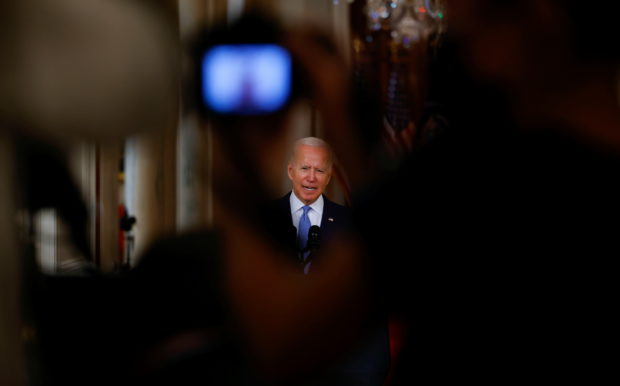Defiant Biden rejects criticism of Afghan exit, points to Afghan military and Trump

U.S. President Joe Biden is seen in a camera viewfinder as he delivers remarks on Afghanistan during a speech in the State Dining Room at the White House in Washington, U.S., August 31, 2021. REUTERS/Carlos Barria
WASHINGTON — President Joe Biden on Tuesday defiantly rejected criticism of his decision to stick to a deadline to pull out of Afghanistan this week, a move that left up to 200 Americans in the country along with thousands of U.S.-aligned Afghan citizens.
In a televised address, Biden offered a sweeping defense of his handling of the Afghanistan withdrawal, saying he inherited an unstable situation from his predecessor, Republican Donald Trump, and that the 20-year war “should have ended long ago.”
“I was not going to extend this forever war, and I was not extending a forever exit,” he said, his voice rising with emotion as he spoke.
Biden’s handling of the withdrawal has drawn sharp criticism from Republicans and his own Democrats as well as foreign allies, punctured his job approval ratings and raised questions about his judgment.
The fate of Americans and Afghans who were not able to get on the last U.S. flights out of Kabul airport this week after the Taliban took over the capital remains a top concern.
Article continues after this advertisementU.S. officials believe 100 to 200 Americans remain in Afghanistan “with some intention to leave,” Biden said. He said most of those who remained were dual citizens and long-time residents who earlier had decided to stay, and added the United States was determined to get them out if they wanted to go.
Article continues after this advertisementMany lawmakers had called on Biden to extend the Aug. 31 deadline to allow more Americans and Afghans to escape. He said on Tuesday it was not an arbitrary deadline, and that sticking to it was aimed at saving lives.
“I take responsibility for the decision. Now some say we should have started mass evacuations sooner and couldn’t this … have been done in a more orderly manner. I respectfully disagree,” he said from the White House State Dining Room.
The White House said it had enormous leverage over the Taliban, including access to the global marketplace, that could be used to ensure Americans get out of the country.
Biden said a deal brokered by the Trump administration last year authorized the release of 5,000 prisoners, including some of the Taliban’s top war commanders.
“By the time I came to office, the Taliban was in its strongest military position since 2001, controlling or contesting nearly half of the country,” he said.
Even if evacuations had begun in June or July, Biden said there still would have been a late rush to the airport by people wanting to leave.
He criticized the ousted Afghan government’s inability to fight back against swift Taliban advances, which forced the United States and its NATO allies into a hasty and humiliating exit.
Biden met now-exiled Afghanistan President Ashraf Ghani in the Oval Office in June and called him an old friend; in a July call he promised Ghani he would “fight hard, diplomatically, politically, economically” to support his government.
But on Tuesday, Biden said “the people of Afghanistan watched their own government collapse and their president flee amid the corruption and malfeasance, handing over the country to their enemy, the Taliban, and significantly increasing the risk to U.S. personnel and our allies.”
The departure of the last U.S. troops this week caps two decades of military involvement in Afghanistan that Biden was determined to end.
While most Americans agreed with him, the chaotic and deadly nature of that end will present fresh challenges in the months ahead.
Biden’s presidency, which had been focused on fighting the coronavirus pandemic and rebuilding the economy, now faces political probes over the handling of the withdrawal as well as the logistical challenge of finding new homes for thousands of Afghans being moved to U.S. military bases.
Biden also must contend with a surge in coronavirus infections, disasters like hurricanes and wildfires, and a series of difficult deadlines to get signature spending measures through Congress.
Republicans and some Democrats have expressed frustration and anger at how fast Afghanistan fell to the Taliban, the former leaders who were ousted by the United States after the Sept. 11, 2001, attacks, and what they call a botched withdrawal.
Republicans are expected to use the crisis to try to derail Biden’s policy and legislative agenda and as a talking point in the 2022 midterm elections. Republicans hope to take control of the Senate and House of Representatives from Biden’s Democrats, which could hobble the second half of his presidential term.
Less than 40% of Americans approve of Biden’s handling of the withdrawal, and three quarters wanted U.S. forces to remain in the country until all American civilians could get out, according to a Reuters/Ipsos opinion poll released on Monday.
Leading House Republicans, including the top Republican on the Foreign Affairs Committee, Michael McCaul, said they wrote on Monday to Biden’s national security adviser, Jake Sullivan, requesting details of the plan to repatriate Americans and evacuate others left behind.
“Congress has a right to know how these evacuations will be facilitated and conducted,” McCaul said in a statement.